Spring 2019 CS 495: Privacy Issues in E-commerce Systems Analysis
VerifiedAdded on 2023/01/16
|5
|1439
|45
Report
AI Summary
This report delves into the critical privacy issues prevalent in e-commerce systems, highlighting their negative impact on the industry's growth and development. The report explores the lack of privacy protection for consumers on e-commerce websites and applications, emphasizing the importance of robust privacy measures. It examines the ethical dimensions of data collection, storage, and usage, as well as the impact of privacy concerns on consumer trust and online sales. The report discusses the rise of behavioral advertising and the use of cookies for tracking user activities, and the potential risks associated with these practices. Furthermore, it outlines practical solutions, such as developing customer-oriented privacy practices and implementing P3P systems, to mitigate privacy risks and foster a secure online environment. The report emphasizes the need for organizations to understand consumer needs and implement systems that ensure the security and privacy of personal information to build trust and expand their potential in the e-commerce landscape.
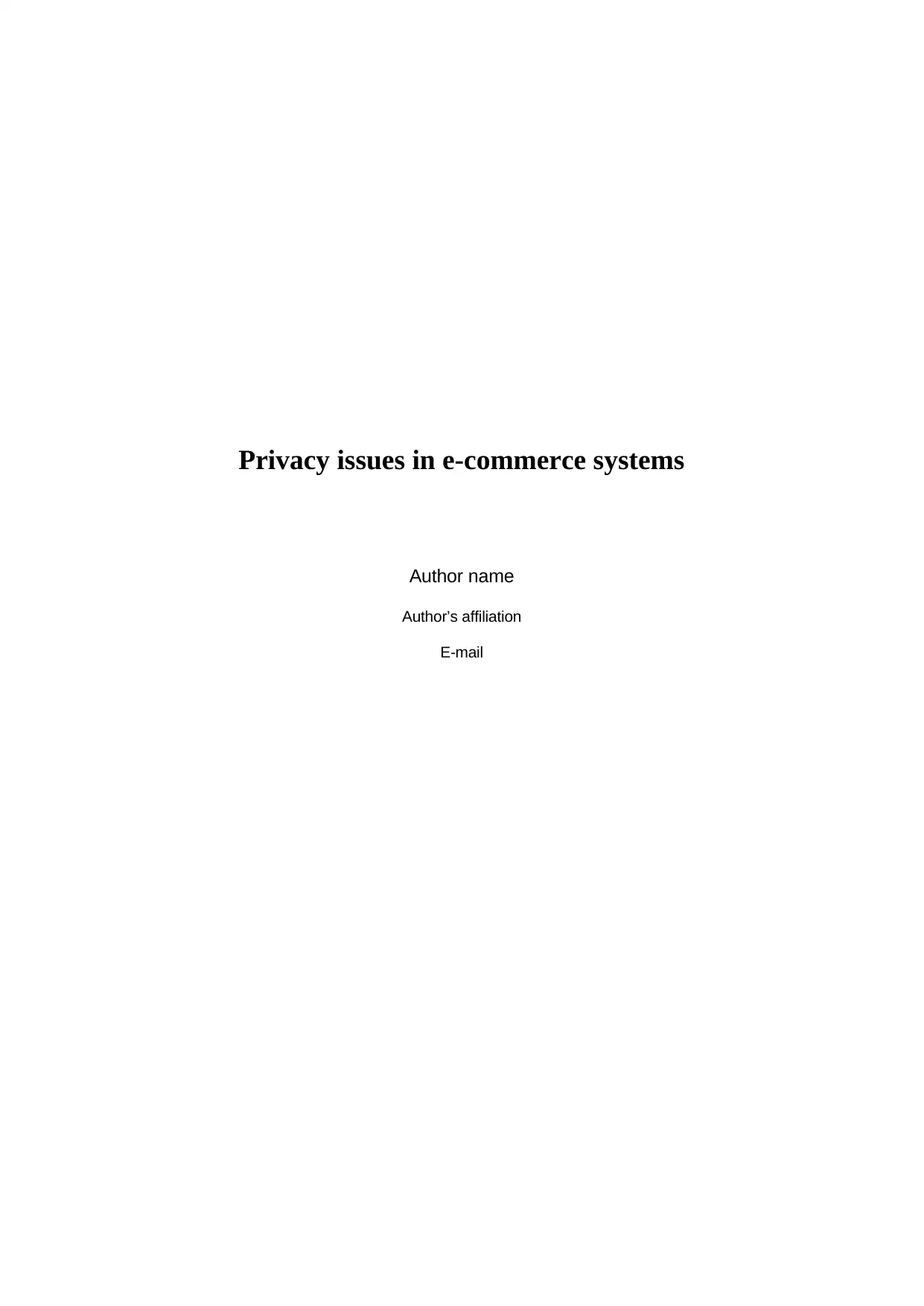
Privacy issues in e-commerce systems
Author name
Author’s affiliation
E-mail
Author name
Author’s affiliation
Paraphrase This Document
Need a fresh take? Get an instant paraphrase of this document with our AI Paraphraser
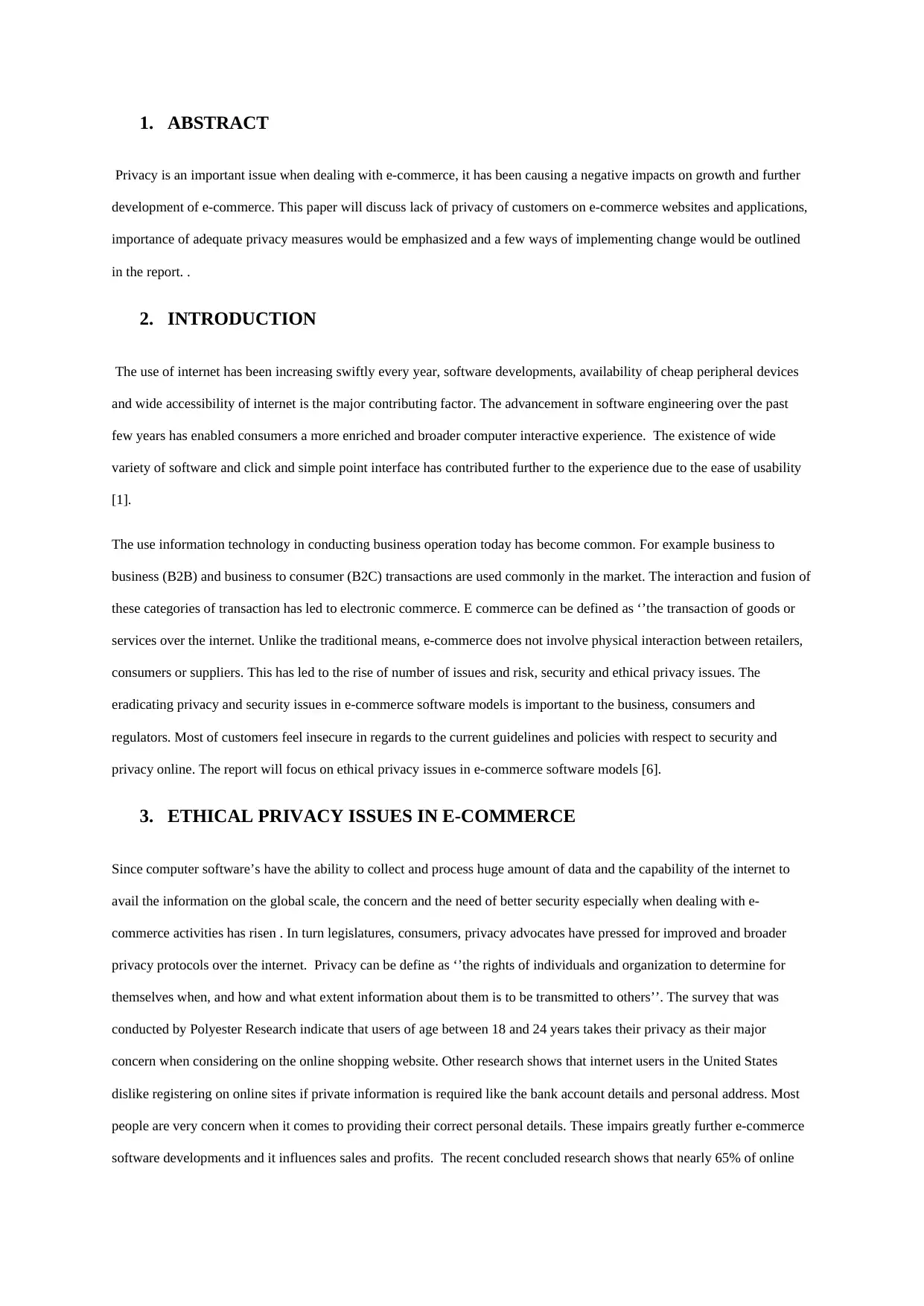
1. ABSTRACT
Privacy is an important issue when dealing with e-commerce, it has been causing a negative impacts on growth and further
development of e-commerce. This paper will discuss lack of privacy of customers on e-commerce websites and applications,
importance of adequate privacy measures would be emphasized and a few ways of implementing change would be outlined
in the report. .
2. INTRODUCTION
The use of internet has been increasing swiftly every year, software developments, availability of cheap peripheral devices
and wide accessibility of internet is the major contributing factor. The advancement in software engineering over the past
few years has enabled consumers a more enriched and broader computer interactive experience. The existence of wide
variety of software and click and simple point interface has contributed further to the experience due to the ease of usability
[1].
The use information technology in conducting business operation today has become common. For example business to
business (B2B) and business to consumer (B2C) transactions are used commonly in the market. The interaction and fusion of
these categories of transaction has led to electronic commerce. E commerce can be defined as ‘’the transaction of goods or
services over the internet. Unlike the traditional means, e-commerce does not involve physical interaction between retailers,
consumers or suppliers. This has led to the rise of number of issues and risk, security and ethical privacy issues. The
eradicating privacy and security issues in e-commerce software models is important to the business, consumers and
regulators. Most of customers feel insecure in regards to the current guidelines and policies with respect to security and
privacy online. The report will focus on ethical privacy issues in e-commerce software models [6].
3. ETHICAL PRIVACY ISSUES IN E-COMMERCE
Since computer software’s have the ability to collect and process huge amount of data and the capability of the internet to
avail the information on the global scale, the concern and the need of better security especially when dealing with e-
commerce activities has risen . In turn legislatures, consumers, privacy advocates have pressed for improved and broader
privacy protocols over the internet. Privacy can be define as ‘’the rights of individuals and organization to determine for
themselves when, and how and what extent information about them is to be transmitted to others’’. The survey that was
conducted by Polyester Research indicate that users of age between 18 and 24 years takes their privacy as their major
concern when considering on the online shopping website. Other research shows that internet users in the United States
dislike registering on online sites if private information is required like the bank account details and personal address. Most
people are very concern when it comes to providing their correct personal details. These impairs greatly further e-commerce
software developments and it influences sales and profits. The recent concluded research shows that nearly 65% of online
Privacy is an important issue when dealing with e-commerce, it has been causing a negative impacts on growth and further
development of e-commerce. This paper will discuss lack of privacy of customers on e-commerce websites and applications,
importance of adequate privacy measures would be emphasized and a few ways of implementing change would be outlined
in the report. .
2. INTRODUCTION
The use of internet has been increasing swiftly every year, software developments, availability of cheap peripheral devices
and wide accessibility of internet is the major contributing factor. The advancement in software engineering over the past
few years has enabled consumers a more enriched and broader computer interactive experience. The existence of wide
variety of software and click and simple point interface has contributed further to the experience due to the ease of usability
[1].
The use information technology in conducting business operation today has become common. For example business to
business (B2B) and business to consumer (B2C) transactions are used commonly in the market. The interaction and fusion of
these categories of transaction has led to electronic commerce. E commerce can be defined as ‘’the transaction of goods or
services over the internet. Unlike the traditional means, e-commerce does not involve physical interaction between retailers,
consumers or suppliers. This has led to the rise of number of issues and risk, security and ethical privacy issues. The
eradicating privacy and security issues in e-commerce software models is important to the business, consumers and
regulators. Most of customers feel insecure in regards to the current guidelines and policies with respect to security and
privacy online. The report will focus on ethical privacy issues in e-commerce software models [6].
3. ETHICAL PRIVACY ISSUES IN E-COMMERCE
Since computer software’s have the ability to collect and process huge amount of data and the capability of the internet to
avail the information on the global scale, the concern and the need of better security especially when dealing with e-
commerce activities has risen . In turn legislatures, consumers, privacy advocates have pressed for improved and broader
privacy protocols over the internet. Privacy can be define as ‘’the rights of individuals and organization to determine for
themselves when, and how and what extent information about them is to be transmitted to others’’. The survey that was
conducted by Polyester Research indicate that users of age between 18 and 24 years takes their privacy as their major
concern when considering on the online shopping website. Other research shows that internet users in the United States
dislike registering on online sites if private information is required like the bank account details and personal address. Most
people are very concern when it comes to providing their correct personal details. These impairs greatly further e-commerce
software developments and it influences sales and profits. The recent concluded research shows that nearly 65% of online
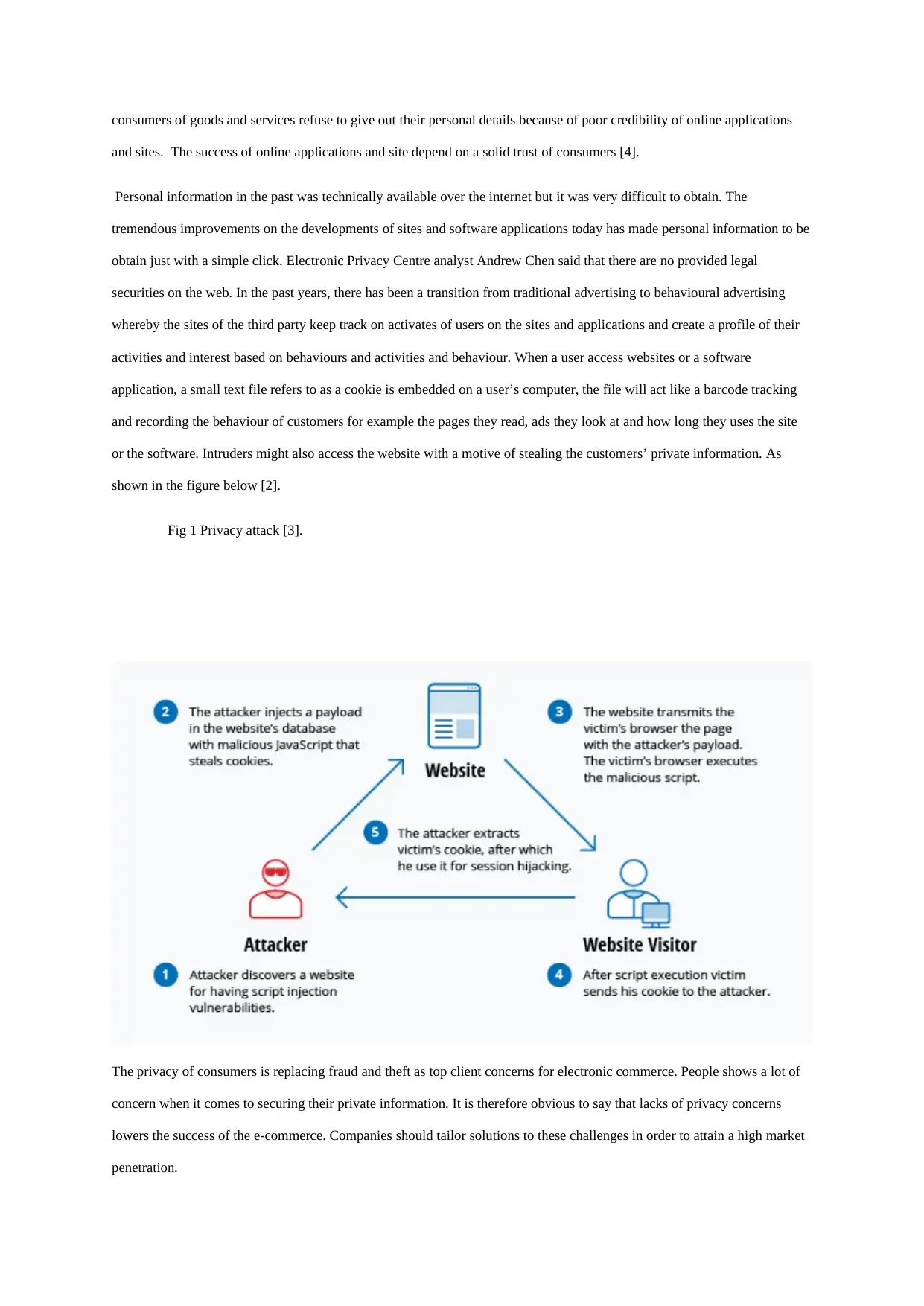
consumers of goods and services refuse to give out their personal details because of poor credibility of online applications
and sites. The success of online applications and site depend on a solid trust of consumers [4].
Personal information in the past was technically available over the internet but it was very difficult to obtain. The
tremendous improvements on the developments of sites and software applications today has made personal information to be
obtain just with a simple click. Electronic Privacy Centre analyst Andrew Chen said that there are no provided legal
securities on the web. In the past years, there has been a transition from traditional advertising to behavioural advertising
whereby the sites of the third party keep track on activates of users on the sites and applications and create a profile of their
activities and interest based on behaviours and activities and behaviour. When a user access websites or a software
application, a small text file refers to as a cookie is embedded on a user’s computer, the file will act like a barcode tracking
and recording the behaviour of customers for example the pages they read, ads they look at and how long they uses the site
or the software. Intruders might also access the website with a motive of stealing the customers’ private information. As
shown in the figure below [2].
Fig 1 Privacy attack [3].
The privacy of consumers is replacing fraud and theft as top client concerns for electronic commerce. People shows a lot of
concern when it comes to securing their private information. It is therefore obvious to say that lacks of privacy concerns
lowers the success of the e-commerce. Companies should tailor solutions to these challenges in order to attain a high market
penetration.
and sites. The success of online applications and site depend on a solid trust of consumers [4].
Personal information in the past was technically available over the internet but it was very difficult to obtain. The
tremendous improvements on the developments of sites and software applications today has made personal information to be
obtain just with a simple click. Electronic Privacy Centre analyst Andrew Chen said that there are no provided legal
securities on the web. In the past years, there has been a transition from traditional advertising to behavioural advertising
whereby the sites of the third party keep track on activates of users on the sites and applications and create a profile of their
activities and interest based on behaviours and activities and behaviour. When a user access websites or a software
application, a small text file refers to as a cookie is embedded on a user’s computer, the file will act like a barcode tracking
and recording the behaviour of customers for example the pages they read, ads they look at and how long they uses the site
or the software. Intruders might also access the website with a motive of stealing the customers’ private information. As
shown in the figure below [2].
Fig 1 Privacy attack [3].
The privacy of consumers is replacing fraud and theft as top client concerns for electronic commerce. People shows a lot of
concern when it comes to securing their private information. It is therefore obvious to say that lacks of privacy concerns
lowers the success of the e-commerce. Companies should tailor solutions to these challenges in order to attain a high market
penetration.
⊘ This is a preview!⊘
Do you want full access?
Subscribe today to unlock all pages.

Trusted by 1+ million students worldwide
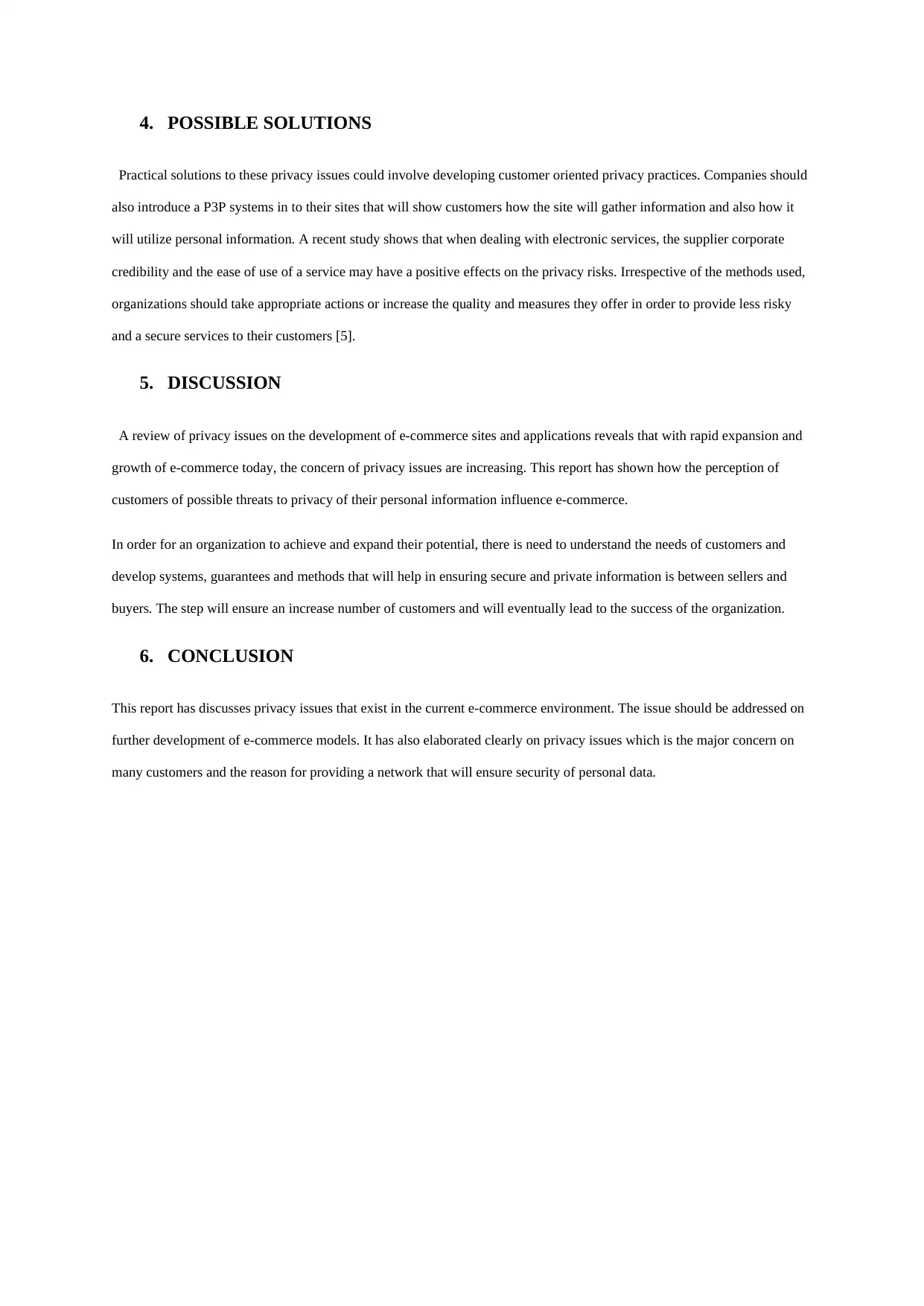
4. POSSIBLE SOLUTIONS
Practical solutions to these privacy issues could involve developing customer oriented privacy practices. Companies should
also introduce a P3P systems in to their sites that will show customers how the site will gather information and also how it
will utilize personal information. A recent study shows that when dealing with electronic services, the supplier corporate
credibility and the ease of use of a service may have a positive effects on the privacy risks. Irrespective of the methods used,
organizations should take appropriate actions or increase the quality and measures they offer in order to provide less risky
and a secure services to their customers [5].
5. DISCUSSION
A review of privacy issues on the development of e-commerce sites and applications reveals that with rapid expansion and
growth of e-commerce today, the concern of privacy issues are increasing. This report has shown how the perception of
customers of possible threats to privacy of their personal information influence e-commerce.
In order for an organization to achieve and expand their potential, there is need to understand the needs of customers and
develop systems, guarantees and methods that will help in ensuring secure and private information is between sellers and
buyers. The step will ensure an increase number of customers and will eventually lead to the success of the organization.
6. CONCLUSION
This report has discusses privacy issues that exist in the current e-commerce environment. The issue should be addressed on
further development of e-commerce models. It has also elaborated clearly on privacy issues which is the major concern on
many customers and the reason for providing a network that will ensure security of personal data.
Practical solutions to these privacy issues could involve developing customer oriented privacy practices. Companies should
also introduce a P3P systems in to their sites that will show customers how the site will gather information and also how it
will utilize personal information. A recent study shows that when dealing with electronic services, the supplier corporate
credibility and the ease of use of a service may have a positive effects on the privacy risks. Irrespective of the methods used,
organizations should take appropriate actions or increase the quality and measures they offer in order to provide less risky
and a secure services to their customers [5].
5. DISCUSSION
A review of privacy issues on the development of e-commerce sites and applications reveals that with rapid expansion and
growth of e-commerce today, the concern of privacy issues are increasing. This report has shown how the perception of
customers of possible threats to privacy of their personal information influence e-commerce.
In order for an organization to achieve and expand their potential, there is need to understand the needs of customers and
develop systems, guarantees and methods that will help in ensuring secure and private information is between sellers and
buyers. The step will ensure an increase number of customers and will eventually lead to the success of the organization.
6. CONCLUSION
This report has discusses privacy issues that exist in the current e-commerce environment. The issue should be addressed on
further development of e-commerce models. It has also elaborated clearly on privacy issues which is the major concern on
many customers and the reason for providing a network that will ensure security of personal data.
Paraphrase This Document
Need a fresh take? Get an instant paraphrase of this document with our AI Paraphraser
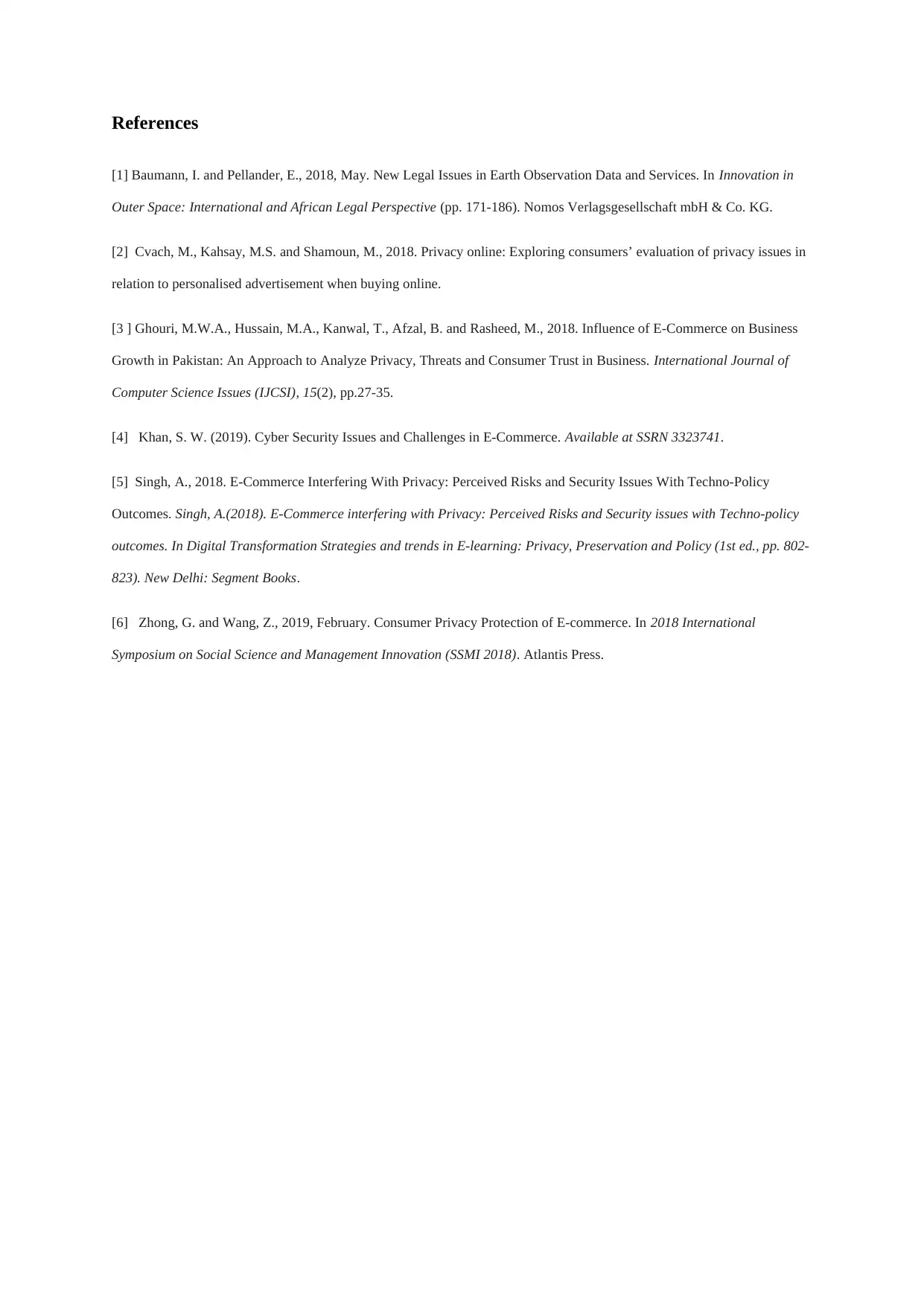
References
[1] Baumann, I. and Pellander, E., 2018, May. New Legal Issues in Earth Observation Data and Services. In Innovation in
Outer Space: International and African Legal Perspective (pp. 171-186). Nomos Verlagsgesellschaft mbH & Co. KG.
[2] Cvach, M., Kahsay, M.S. and Shamoun, M., 2018. Privacy online: Exploring consumers’ evaluation of privacy issues in
relation to personalised advertisement when buying online.
[3 ] Ghouri, M.W.A., Hussain, M.A., Kanwal, T., Afzal, B. and Rasheed, M., 2018. Influence of E-Commerce on Business
Growth in Pakistan: An Approach to Analyze Privacy, Threats and Consumer Trust in Business. International Journal of
Computer Science Issues (IJCSI), 15(2), pp.27-35.
[4] Khan, S. W. (2019). Cyber Security Issues and Challenges in E-Commerce. Available at SSRN 3323741.
[5] Singh, A., 2018. E-Commerce Interfering With Privacy: Perceived Risks and Security Issues With Techno-Policy
Outcomes. Singh, A.(2018). E-Commerce interfering with Privacy: Perceived Risks and Security issues with Techno-policy
outcomes. In Digital Transformation Strategies and trends in E-learning: Privacy, Preservation and Policy (1st ed., pp. 802-
823). New Delhi: Segment Books.
[6] Zhong, G. and Wang, Z., 2019, February. Consumer Privacy Protection of E-commerce. In 2018 International
Symposium on Social Science and Management Innovation (SSMI 2018). Atlantis Press.
[1] Baumann, I. and Pellander, E., 2018, May. New Legal Issues in Earth Observation Data and Services. In Innovation in
Outer Space: International and African Legal Perspective (pp. 171-186). Nomos Verlagsgesellschaft mbH & Co. KG.
[2] Cvach, M., Kahsay, M.S. and Shamoun, M., 2018. Privacy online: Exploring consumers’ evaluation of privacy issues in
relation to personalised advertisement when buying online.
[3 ] Ghouri, M.W.A., Hussain, M.A., Kanwal, T., Afzal, B. and Rasheed, M., 2018. Influence of E-Commerce on Business
Growth in Pakistan: An Approach to Analyze Privacy, Threats and Consumer Trust in Business. International Journal of
Computer Science Issues (IJCSI), 15(2), pp.27-35.
[4] Khan, S. W. (2019). Cyber Security Issues and Challenges in E-Commerce. Available at SSRN 3323741.
[5] Singh, A., 2018. E-Commerce Interfering With Privacy: Perceived Risks and Security Issues With Techno-Policy
Outcomes. Singh, A.(2018). E-Commerce interfering with Privacy: Perceived Risks and Security issues with Techno-policy
outcomes. In Digital Transformation Strategies and trends in E-learning: Privacy, Preservation and Policy (1st ed., pp. 802-
823). New Delhi: Segment Books.
[6] Zhong, G. and Wang, Z., 2019, February. Consumer Privacy Protection of E-commerce. In 2018 International
Symposium on Social Science and Management Innovation (SSMI 2018). Atlantis Press.
1 out of 5
Related Documents
Your All-in-One AI-Powered Toolkit for Academic Success.
+13062052269
info@desklib.com
Available 24*7 on WhatsApp / Email
![[object Object]](/_next/static/media/star-bottom.7253800d.svg)
Unlock your academic potential
Copyright © 2020–2026 A2Z Services. All Rights Reserved. Developed and managed by ZUCOL.





